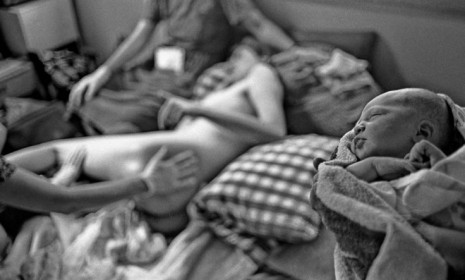The 'astounding' rise of home births: 5 theories
From 2004 to 2008, the number of American moms giving birth at home increased dramatically. Why?

A free daily email with the biggest news stories of the day – and the best features from TheWeek.com
You are now subscribed
Your newsletter sign-up was successful
Throughout the 1990s and early 2000s, home births were on the decline. But in recent years, they've seen an "astounding" surge in popularity. From 2004 to 2008, home births increased by 20 percent. Of course, home births still represent less than 1 percent of total births. Of the 4.2 million babies born from 2004 to 2008, 28,357 were born at home, according to a recently released CDC study. But the tally of home births is still trending upward. What's behind the rise? Here, five theories:
1. Home births are no longer just for hippies
"At first, in the 1970s, it was largely a hippie, countercultural thing to give birth outside of the hospital," says Robbie Davis-Floyd, a medical anthropologist, as quoted by Care2. "Over the years, as the formerly 'lay' midwives have become far more sophisticated, so has their clientele."
The Week
Escape your echo chamber. Get the facts behind the news, plus analysis from multiple perspectives.

Sign up for The Week's Free Newsletters
From our morning news briefing to a weekly Good News Newsletter, get the best of The Week delivered directly to your inbox.
From our morning news briefing to a weekly Good News Newsletter, get the best of The Week delivered directly to your inbox.
2. And home births have gotten hip
"The 'hipness' of home birth was signaled in 2008 by the release of The Business of Being Born, a documentary produced by Ricki Lake, which extolled the virtues of home birth," says Amelia T. at Care2. The film was controversial, but it was also popular, and it brought home birth into the mainstream.
3. Women are taking charge
"Finally, women are taking childbirth back!" says Jacqueline Burt at The Stir. "For decades, mainstream medicine has handled childbirth with the same alarmist regulatory practices they use for procedures like open heart surgery," and, at last, women are realizing that it doesn't have to be that way. "Our bodies are built to deliver babies."
A free daily email with the biggest news stories of the day – and the best features from TheWeek.com
4. It's a backlash against C-sections
"Some home birthers cite concerns over Caesarean sections," says Leanne Italia for the Associated Press. "The U.S. rate of C-sections in hospitals hovers around 32 percent, soaring up to 60 percent in some areas." The rise of home births might be, in part, a response to the Caesarean birth boom, a "too posh to push" mentality, and the rise of scheduled inductions for the convenience of all involved.
5. They're cheaper, and, some say, safer
"While home births are appealing because they're less expensive, especially for the uninsured, they're also safer for low-risk births than going to a hospital," says Amelia T. For women who are unlikely to have complications, giving birth at home means more personalized care and "a more individualized experience."
-
 The ‘ravenous’ demand for Cornish minerals
The ‘ravenous’ demand for Cornish mineralsUnder the Radar Growing need for critical minerals to power tech has intensified ‘appetite’ for lithium, which could be a ‘huge boon’ for local economy
-
 Why are election experts taking Trump’s midterm threats seriously?
Why are election experts taking Trump’s midterm threats seriously?IN THE SPOTLIGHT As the president muses about polling place deployments and a centralized electoral system aimed at one-party control, lawmakers are taking this administration at its word
-
 ‘Restaurateurs have become millionaires’
‘Restaurateurs have become millionaires’Instant Opinion Opinion, comment and editorials of the day